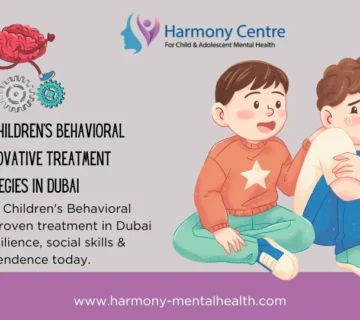Positive Parenting Strategies Dubai: Empowering Families for a Brighter Future at Harmony Centre
Discover positive parenting strategies in Dubai at Harmony Centre. Our expert, evidence‑based techniques empower families to foster resilience, effective communication, and nurturing relationships.
Contact Information
| Contact Method | Details |
|---|---|
| Phone | +971 (52) 8773268 / 04 558 2015 |
| Click Here | |
| info@harmony-mentalhealth.com | |
| Address | Office 409, Building Alrazi-64C, 26th St, Healthcare City, Dubai |
Introduction
In the dynamic and diverse city of Dubai, families face unique challenges that require adaptable and nurturing parenting approaches. At Harmony Centre Mental Health Dubai, we believe that positive parenting is the foundation for raising resilient, confident, and emotionally healthy children. Our evidence‑based, culturally sensitive strategies provide parents with the tools to create a supportive environment where children can thrive academically, socially, and emotionally.
Positive parenting goes beyond discipline—it is about fostering open communication, empathy, and mutual respect within the family. In this comprehensive guide, we outline actionable strategies and practical tips designed to empower parents in Dubai. Whether you’re navigating the challenges of modern life or seeking to enhance your parenting skills, our multidisciplinary team is here to support you every step of the way.
Learn More About Harmony Centre • Contact Us
Understanding Positive Parenting
What Is Positive Parenting?
Positive parenting is an approach that emphasizes the nurturing aspects of raising children. It focuses on building a strong, supportive relationship between parents and children through empathy, open communication, and consistent guidance. Rather than relying on punitive measures, positive parenting encourages cooperation, problem‑solving, and the development of intrinsic motivation.
Core Principles of Positive Parenting
- Empathy and Understanding:
Recognize and validate your child’s feelings, helping them understand and manage their emotions. - Consistent Boundaries:
Establish clear and consistent rules while allowing room for discussion and flexibility. - Active Listening:
Engage in meaningful conversations with your child, showing that their opinions and feelings matter. - Positive Reinforcement:
Encourage desired behaviors through praise and rewards rather than focusing solely on punishment for negative behavior. - Modeling Behavior:
Demonstrate the values and behaviors you wish to see in your child through your own actions.
The Benefits of Positive Parenting
Embracing positive parenting strategies offers numerous benefits for both children and families:
- Enhanced Emotional Well‑Being:
Children develop healthier coping mechanisms, resulting in improved self‑esteem and resilience. - Improved Social Skills:
Positive parenting fosters better communication and interpersonal skills, leading to stronger relationships with peers and teachers. - Academic Success:
A supportive home environment can boost concentration, motivation, and overall academic performance. - Reduced Behavioral Problems:
Consistent, empathetic parenting reduces the frequency of tantrums, defiance, and other disruptive behaviors. - Stronger Family Bonds:
Open communication and mutual respect create a nurturing environment where every family member feels valued.
Key Strategies for Positive Parenting
1. Active Listening and Open Communication
The Importance of Active Listening
Active listening is a cornerstone of positive parenting. It involves giving your child your full attention, validating their feelings, and responding thoughtfully. This practice not only builds trust but also encourages children to share their thoughts and emotions freely.
Tips for Effective Communication
- Eliminate Distractions:
During conversations, turn off electronic devices and focus entirely on your child. - Reflect and Paraphrase:
Repeat back what your child says to confirm understanding. For example, “It sounds like you’re upset because you lost your toy.” - Ask Open-Ended Questions:
Encourage deeper discussion with questions like, “How did that make you feel?” or “What do you think we can do about it?” - Be Patient:
Allow your child time to articulate their thoughts without rushing or interrupting.
Transition: With open communication as the foundation, let’s explore how consistent boundaries can further enhance your parenting approach.
2. Establishing Consistent Boundaries and Routines
The Role of Structure in Positive Parenting
Setting clear boundaries and maintaining consistent routines provides children with a sense of security. When children know what to expect, they are better able to focus on learning and developing positive behaviors.
Strategies for Consistency
- Create a Daily Schedule:
Use visual schedules or calendars to outline routines for homework, meals, playtime, and bedtime. - Set Clear Rules:
Establish simple, consistent rules that everyone in the family understands. Explain the reasons behind each rule to foster cooperation. - Be Consistent:
Enforce rules consistently across different settings (home, school, and social environments) to reinforce expectations. - Adapt as Needed:
While consistency is key, be flexible and adjust routines based on your child’s evolving needs.
Transition: Beyond routines, building empathy within the family is essential for positive parenting.
3. Cultivating Empathy and Emotional Support
The Power of Empathy in Parenting
Empathy involves understanding and sharing your child’s feelings. When parents demonstrate empathy, children feel heard and valued, which is vital for their emotional development.
Ways to Cultivate Empathy
- Validate Emotions:
Acknowledge your child’s feelings without judgment. For instance, “I understand you’re disappointed because you didn’t win the game.” - Share Personal Experiences:
Talk about times when you felt similar emotions, which can help normalize their experiences. - Encourage Perspective-Taking:
Ask questions that help your child consider others’ feelings, such as “How do you think your friend felt when that happened?” - Model Empathetic Behavior:
Demonstrate empathy in your own interactions with others, showing your child the importance of compassion and understanding.
Transition: With empathy and structure in place, consistent reinforcement through positive feedback is crucial for lasting change.
4. Using Positive Reinforcement and Constructive Feedback
Reinforcing Positive Behavior
Positive reinforcement involves acknowledging and rewarding desirable behaviors, which motivates children to repeat them. This approach is much more effective than punitive measures in fostering long-term positive behavior.
Effective Techniques for Positive Reinforcement
- Praise Specific Behaviors:
Instead of general compliments like “Good job,” say, “I really appreciate how you shared your toys with your friend today.” - Reward Systems:
Implement reward charts or token systems where children earn rewards for meeting behavioral goals. - Celebrate Achievements:
Recognize and celebrate both small and large successes to boost self‑confidence. - Provide Constructive Feedback:
When addressing undesirable behaviors, focus on how to improve rather than just highlighting the problem. For example, “Next time, try using your words to express your frustration.”
Transition: Consistency in these strategies across home, school, and community settings further solidifies their impact.
Integrating Positive Parenting Strategies Across Settings
For Families
Creating a Nurturing Home Environment
- Family Meetings:
Hold regular meetings where every member, including children, is encouraged to share their thoughts and feelings. - Engage in Shared Activities:
Participate in activities like cooking together, board games, or outdoor adventures that naturally encourage conversation and bonding. - Model Positive Behavior:
Demonstrate the behaviors you want to see by treating others with respect and kindness.
Learn More About Harmony Centre • Contact Us
For Educators
Enhancing Communication in the Classroom
- Implement SEL Programs:
Social‑Emotional Learning (SEL) curricula help students develop emotional regulation and empathy. - Facilitate Open Discussions:
Create classroom environments where students feel safe to share their ideas and feelings. - Collaborate with Parents:
Maintain regular communication with parents to ensure that home and school strategies align, reinforcing positive behaviors consistently.
For the Community
Promoting Positive Parenting Through Public Initiatives
- Workshops and Seminars:
Attend or host community events focused on positive parenting techniques to share best practices and resources. - Support Networks:
Join local parent support groups to exchange experiences, tips, and advice on fostering positive family dynamics. - Digital Outreach:
Leverage online platforms and social media to spread awareness about positive parenting strategies and connect with other families.
Explore Our Community Initiatives
Get in Touch
Evidence-Based Outcomes and Success Stories
Quantitative Improvements
Studies have shown that families who actively implement positive parenting strategies experience measurable benefits:
- Improved Communication:
Regular family meetings and open dialogues can lead to a 30–40% improvement in effective communication. - Reduced Behavioral Issues:
Consistent positive reinforcement and structured routines have been associated with a reduction in behavioral problems by up to 25%. - Enhanced Academic Performance:
When children feel supported at home, they often perform better academically, as evidenced by improved concentration and participation.
Qualitative Success
Real-life testimonials from families and educators highlight the transformative power of positive parenting:
“After adopting the positive parenting strategies from Harmony Centre, our family has become much more connected. My child is more confident, and our communication has never been better.”
– Parent Testimonial
“The techniques taught in the parenting workshops have made a significant difference in my classroom. Students are more engaged, and conflicts have decreased noticeably.”
– Educator Testimonial
For further insights into effective parenting practices, visit the American Psychological Association (external link).
Frequently Asked Questions about Positive Parenting Strategies Dubai
Book a Consultation Now
Contact Information
Office Address:
Office 409, Building Alrazi-64C, 26th St, Umm Hurair 2, Dubai Healthcare City, Dubai
Phone:
+971 4 558 2015
+971 5 287 73268
Email:
info@harmony-mentalhealth.com
Final Thoughts about Positive Parenting Strategies Dubai
Positive parenting is a transformative approach that empowers families to create nurturing, resilient environments for children. At Harmony Centre Mental Health Dubai, our comprehensive, evidence‑based strategies help bridge the gap between emotional understanding and practical action, fostering stronger family bonds and enhanced communication. By actively engaging in open dialogue, consistent routines, and empathetic interactions, parents can equip their children with the skills they need to thrive both academically and emotionally.
Invest in your family’s future with expert guidance from Harmony Centre—your trusted partner in creating a supportive, positive, and resilient home environment in Dubai.
Learn More About Harmony Centre
Get in Touch
👉 Book a Consultation Now: Call +971 4 558 2015 or visit www.harmony-mentalhealth.com.
Join our online community and stay updated with our latest events, articles about Positive Parenting Strategies Dubai



